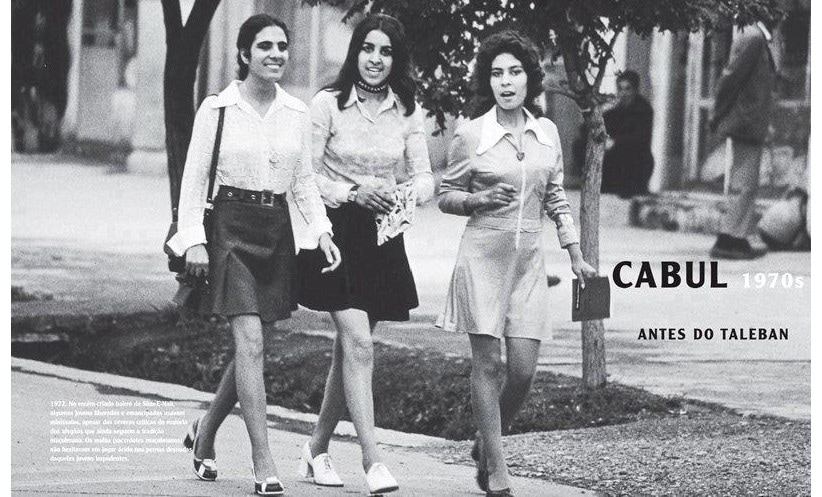
1972: Afghan women in the streets of Kabul city (picture: Laurence Brun/Rapho).
It is an international plot against the Afghans, hatched in Doha but authored by America. It is facilitated by the Qatari government and it will destroy Afghan women's liberty.
Until the 1970s, Afghan women, dressed in miniskirts, breathing in the air of liberty, upholding their personal individualism, walked the streets of Kabul, going into offices, schools, and universities. Kabul was the most cosmopolitan city. Delhi was a village of orthodoxy, irrational ideas, and obscurantism. From Afghanistan to Pakistan and India and beyond, Afghan women were the first to get the right to vote as early as in 1919. American women were not yet allowed to vote at that time.
Then the Russian military intervention in 1979 destabilized the order of Afghan liberty. The mujahideen, backed by the U.S. and Saudi Arabia, mentored and guided by Pakistan, emerged victorious by the end of 1980s. The Taliban are their successors. During the 1990s, the Taliban seized power and unleashed their orthodox and obscurantist ideas on the Afghans. The burqa-clad Afghan woman became the global face of Afghanistan. Benazir Bhutto, the leader of Pakistan on a visit to Washington D.C., called the Taliban "our children."
In 2001, history offered a chance to Afghans to redeem their glorious, liberal past. American soldiers, arriving to avenge the attacks of 9/11, were seen as harbingers of democratic rights, as a promise to re-establish the order of Afghan liberty. Pakistan, which had been seeking for decades to establish an Islamic corridor to Central Asia, sheltered the Taliban jihadis fleeing Afghanistan. Over the next 18 years, while the American soldiers fought in Afghanistan, Pakistan hosted the Taliban commanders, on the watch of the U.S., in Quetta.
As we move into the year 2020, an international plot against Afghanistan, conceived in Doha, has unfolded before our eyes. Over the past few years, the Taliban safehavens in the Pakistani city of Quetta and the region of Waziristan have moved to Qatar – facilitated by America and Pakistan. It is in Doha from where the Taliban's topmost leadership plots and directs jihadi terrorists in Afghanistan. While the safehavens continue to exist in Pakistan, Doha has emerged as another safehaven for the Taliban.
On December 30, 2019, it emerged that the U.S. has agreed to the release of 5,000 Taliban terrorists from Afghan prisons as part of a future agreement with the Islamic Emirate of Afghanistan (the Taliban organization). According to a report by the Associated Press, the Taliban prisoners' release has been written into the draft agreement. The move to free 5,000 Taliban jihadis is a Doha plot to arm the Islamic Emirate and transform it into a formidable force of terror, which will protect Qatar, whenever needed, alongside the Turkish forces.
It's a tragedy – desired by Qatar, facilitated by America, authored by Zalmay Khalilzad, the lead U.S. negotiator with the Taliban. It helps Pakistan. It harms Afghans; it damages the democratic government of Afghanistan elected by the people just a few months ago. It curbs women's rights and liberties; it blocks the path of individual freedom necessary for the advancement of tribes, communities, and nations. If America's sole goal is to withdraw its soldiers from Afghanistan, it is free to do so without handing land to the Taliban in a peace agreement by which they will not abide anyway.
On December 27, 2019, media reports indicated that some Taliban leaders were open to a short ceasefire. However, the Taliban are a jihadi force, motivated by a religious ideological outlook, not the interests of Afghans, especially women and civil society groups that form the infrastructure of a modern society in any country. It came as no surprise that Zabihullah Mujahid, the spokesman of the Islamic Emirate, released a statement saying that the Taliban will not agree to a ceasefire.
Zabihullah Mujahid described media reports about the ceasefire as "false and baseless" and as "propaganda" by media organizations. He wrote: "The reality of the situation is that the Islamic Emirate has no intention of declaring a ceasefire." Through ten rounds of talks between the U.S. and the Taliban, the Taliban strategy has been to use Doha to hold international talks and gain diplomatic legitimacy and sign an agreement in which the Taliban are equal with the U.S. without committing even to a ceasefire.
If the U.S. wants to withdraw troops from Afghanistan, it should just walk out and continue to support the democratically elected government of Afghanistan with no boots on the ground. The withdrawal of American troops without a ceasefire monitored by a United Nations peacekeeping force will unleash an era of repression on the Afghans. The result of a shady pact with the Taliban jihadi force will not be different. The Doha agreement will herald a new dark age for Afghans and will, more worryingly, arm the Taliban again, much to the delight of Pakistan and Qatar.
* This article was first published on January 1, 2020, by Afghan news agency Khaama.com. Tufail Ahmad is Senior Fellow for the MEMRI Islamism and Counter-Radicalization Initiative.





